and,_but_or用法归纳[1]
- 格式:doc
- 大小:33.50 KB
- 文档页数:3
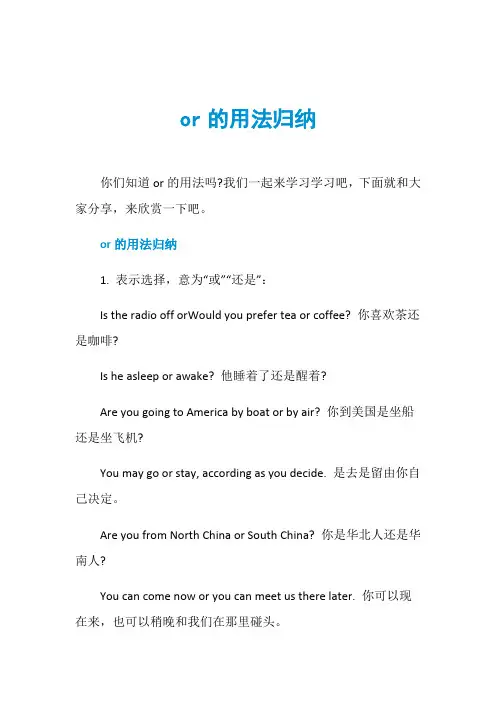
or的用法归纳你们知道or的用法吗?我们一起来学习学习吧,下面就和大家分享,来欣赏一下吧。
or的用法归纳1. 表示选择,意为“或”“还是”:Is the radio off orWould you prefer tea or coffee? 你喜欢茶还是咖啡?Is he asleep or awake? 他睡着了还是醒着?Are you going to America by boat or by air? 你到美国是坐船还是坐飞机?You may go or stay, according as you decide. 是去是留由你自己决定。
Are you from North China or South China? 你是华北人还是华南人?You can come now or you can meet us there later. 你可以现在来,也可以稍晚和我们在那里碰头。
2. 表示一种否定的条件,意为“否则”:Come on, or we’ll be late. 快点,否则我们要迟到了。
Hurry up, or youll be late for school.赶快,否则你上学就要迟到了。
Dress warmly, or else you’ll catch cold. 穿暖和点,否则你会感冒的。
Be careful, or you’ll break that vase! 小心,否则你会把那花瓶打碎!Cross the road very carefully. Look both ways, or you might be knocked down. 过马路要非常小心,要看两边,不然会被车撞倒。
3. 可表示“要不就是”:He must be joking, or else he’s mad. 他一定在说笑话,要不就是疯了。
The book must be here, or else you’ve lost it. 这书一定在这儿,要不就是你丢失了。

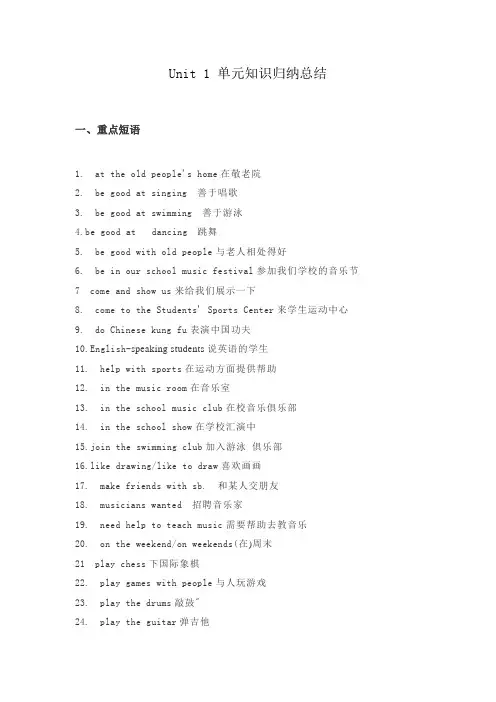
Unit 1 单元知识归纳总结一、重点短语1. at the old people's home在敬老院2. be good at singing 善于唱歌3. be good at swimming 善于游泳4.be good at dancing 跳舞5. be good with old people与老人相处得好6. be in our school music festival参加我们学校的音乐节7 come and show us来给我们展示一下8. come to the Students' Sports Center来学生运动中心9. do Chinese kung fu表演中国功夫10.English-speaking students说英语的学生11. help with sports在运动方面提供帮助12. in the music room在音乐室13. in the school music club在校音乐俱乐部14. in the school show在学校汇演中15.join the swimming club加入游泳俱乐部16.like drawing/like to draw喜欢画画17. make friends with sb. 和某人交朋友18. musicians wanted 招聘音乐家19. need help to teach music需要帮助去教音乐20. on the weekend/on weekends(在)周末21 play chess下国际象棋22. play games with people与人玩游戏23. play the drums敲鼓"24. play the guitar弹吉他25. play the piano 弹钢琴26. play the violin 拉小提琴"27. students wanted for the school show为学校演出招募学生28. tell stories讲故事29. the story telling club讲故事俱乐部30. talk with sb. about sth. 和某人谈论某事二、重点句型1.—Can you play the guitar or the violin?你会弹吉他还是拉小提琴?—I can play the guitar.我会弹吉他。
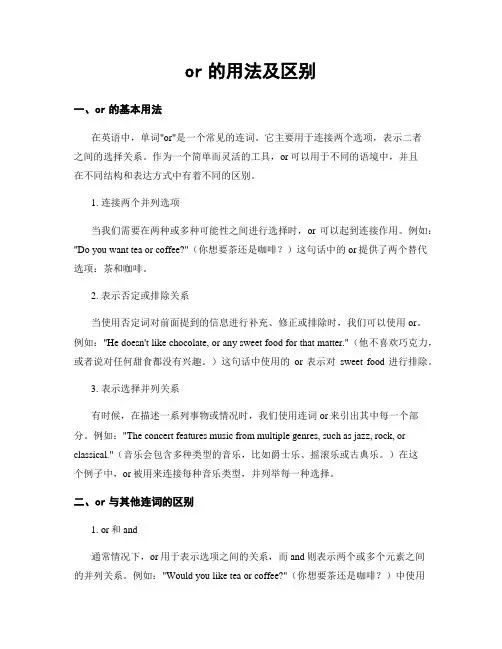
or的用法及区别一、or的基本用法在英语中,单词"or"是一个常见的连词。
它主要用于连接两个选项,表示二者之间的选择关系。
作为一个简单而灵活的工具,or可以用于不同的语境中,并且在不同结构和表达方式中有着不同的区别。
1. 连接两个并列选项当我们需要在两种或多种可能性之间进行选择时,or可以起到连接作用。
例如:"Do you want tea or coffee?"(你想要茶还是咖啡?)这句话中的or提供了两个替代选项:茶和咖啡。
2. 表示否定或排除关系当使用否定词对前面提到的信息进行补充、修正或排除时,我们可以使用or。
例如:"He doesn't like chocolate, or any sweet food for that matter."(他不喜欢巧克力,或者说对任何甜食都没有兴趣。
)这句话中使用的or表示对sweet food进行排除。
3. 表示选择并列关系有时候,在描述一系列事物或情况时,我们使用连词or来引出其中每一个部分。
例如:"The concert features music from multiple genres, such as jazz, rock, or classical."(音乐会包含多种类型的音乐,比如爵士乐、摇滚乐或古典乐。
)在这个例子中,or被用来连接每种音乐类型,并列举每一种选择。
二、or与其他连词的区别1. or和and通常情况下,or用于表示选项之间的关系,而and则表示两个或多个元素之间的并列关系。
例如:"Would you like tea or coffee?"(你想要茶还是咖啡?)中使用的是or,因为我们只需要选择其中一种饮料。
然而,若改为"Would you like tea and coffee?"(你想要茶和咖啡吗?),这句话则表明可以同时选择两者。
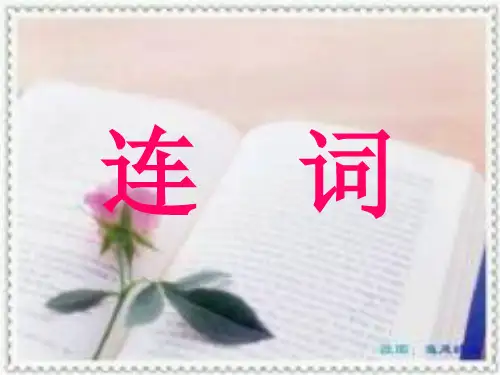
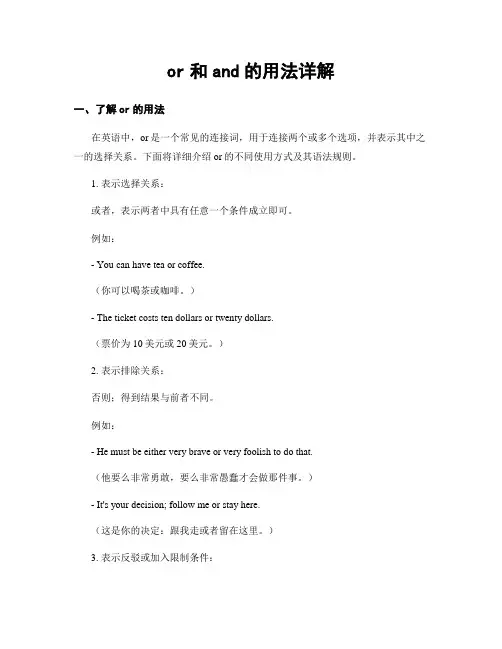
or和and的用法详解一、了解or的用法在英语中,or是一个常见的连接词,用于连接两个或多个选项,并表示其中之一的选择关系。
下面将详细介绍or的不同使用方式及其语法规则。
1. 表示选择关系:或者,表示两者中具有任意一个条件成立即可。
例如:- You can have tea or coffee.(你可以喝茶或咖啡。
)- The ticket costs ten dollars or twenty dollars.(票价为10美元或20美元。
)2. 表示排除关系:否则;得到结果与前者不同。
例如:- He must be either very brave or very foolish to do that.(他要么非常勇敢,要么非常愚蠢才会做那件事。
)- It's your decision; follow me or stay here.(这是你的决定:跟我走或者留在这里。
)3. 表示反驳或加入限制条件:用来表示对前提条件进行反驳或附加额外限制。
例如:- He said he would come tomorrow, but I doubt it—unless he gets delayed.(他说他明天会来,但我怀疑——除非他被耽搁了。
)- She likes all kinds of fruit, except for bananas and oranges.(她喜欢各种水果,除了香蕉和橙子。
)二、深入理解and的用法and也是一个常见的连接词,与or不同之处在于,and表示两个或多个选项都同时成立。
下面将详细介绍and的不同使用方式及其语法规则。
1. 表示并列关系:以及、加、还有。
例如:- I bought pens and notebooks for school.(我买了钢笔和笔记本纸供学校使用。
)- She can speak English, French, and German fluently.(她能流利地讲英语、法语和德语。
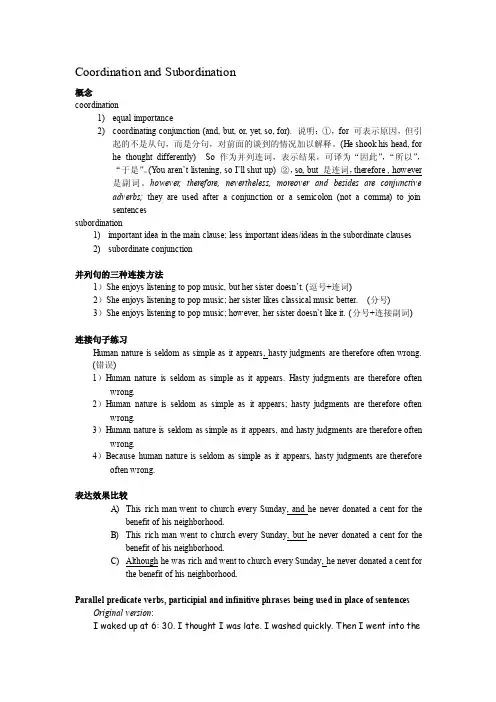
Coordination and Subordination概念coordination1)equal importance2)coordinating conjunction (and, but, or, yet, so, for). 说明:①,for 可表示原因,但引起的不是从句,而是分句,对前面的谈到的情况加以解释。
(He shook his head, forhe thought differently) So 作为并列连词,表示结果,可译为“因此”,“所以”,“于是”。
(Y ou aren’t listening, so I’ll shut up)②,so, but 是连词,therefore , however是副词。
however, therefore, nevertheless, moreover and besides are conjunctiveadverbs; they are used after a conjunction or a semicolon (not a comma) to joinsentencessubordination1)important idea in the main clause; less important ideas/ideas in the subordinate clauses2)subordinate conjunction并列句的三种连接方法1)She enjoys listening to pop music, but her sister doesn’t. (逗号+连词)2)She enjoys listening to pop music; her sister likes classical music better. (分号)3)She enjoys listening to pop music; however, her sister doesn’t like it. (分号+连接副词)连接句子练习Human nature is seldom as simple as it appears, hasty judgments are therefore often wrong.(错误)1)Human nature is seldom as simple as it appears. Hasty judgments are therefore often wrong.2)Human nature is seldom as simple as it appears; hasty judgments are therefore often wrong.3)Human nature is seldom as simple as it appears, and hasty judgments are therefore often wrong.4)Because human nature is seldom as simple as it appears, hasty judgments are therefore often wrong.表达效果比较A)This rich man went to church every Sunday, and he never donated a cent for thebenefit of his neighborhood.B)This rich man went to church every Sunday, but he never donated a cent for thebenefit of his neighborhood.C)Although he was rich and went to church every Sunday, he never donated a cent forthe benefit of his neighborhood.Parallel predicate verbs, participial and infinitive phrases being used in place of sentences Original version:I waked up at 6: 30. I thought I was late. I washed quickly. Then I went into thekitchen. I found something to eat. I finished eating in a few minutes. I took my book and hurried out. I rode very fast along the street. Soon I was at the school gate. But it was closed. Then I realized it was Saturday.New version:It was 6:30 when I waked up. Thinking that I would be late for school, I washed and ate something in a hurry, got on my bike and set out for school. On the streets I rode as fast as I could, and in no time I was at the school gate, only to find it closed. Then I remembered that it was Saturday.Practice 1)Improve the following sentences by using subordination skills.1. Computers calculate rapidly, and they do more work than man in the same time, and they threaten many jobs, but we must use them.2. This mountain is six thousand feet high, and it is only four miles from the airport, and the field is not a very large one, but no plane has ever crashed on it.3. Benjamin Franklin was an American, but he was at home wherever he went, and so he gained wide popularity in France, and he was also well known in England.4. The Senator was a Liberal, and so he was in favor of the welfare program, and the new tax bill seemed to him inadequate, and so he voted against it.5. Women have been discriminated against, and they have been patient, but now they are complaining, and their cause is just.Practice 2)Improve the sentences and at the same time make important ideas prominent.1. A lifetime is short, but much can be accomplished.2. In spite of the fact he became a great preacher, Cotton Mather had a speech defect.3. When most drivers apply the brakes, they are in doubt.4. Corruption in high places became wide spread; the Roman Empire was considerably weakened.5. Archimedes took a bath, and he formulated one of the most important principles in the physics.6. Mr. Levin left the meeting early. Nobody knows why he did.7. The examination was difficult, but she passed with a high grade.8. My history teacher has written a book, it has a bright-blue cover.9. Darwin studied medicine and theology before deciding on science. He wrote On the Origin of Species by Means of Natural Selection. It was published in 1859.10. A one-hour swim in the lake does not exhaust Zhang Jian. He is a good swimmer.。
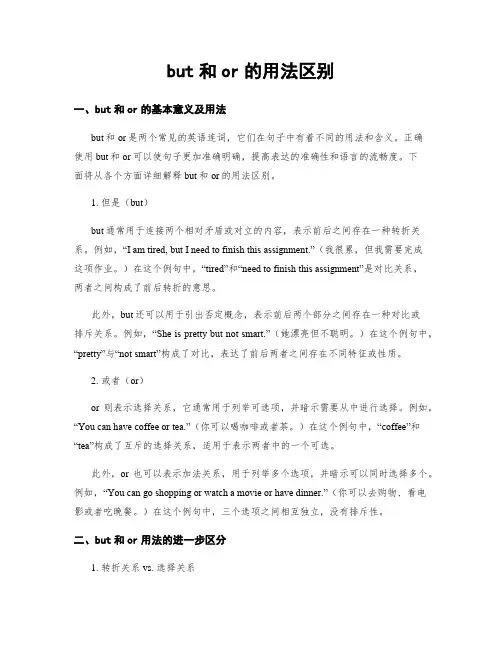
but和or的用法区别一、but和or的基本意义及用法but和or是两个常见的英语连词,它们在句子中有着不同的用法和含义。
正确使用but和or可以使句子更加准确明确,提高表达的准确性和语言的流畅度。
下面将从各个方面详细解释but和or的用法区别。
1. 但是(but)but通常用于连接两个相对矛盾或对立的内容,表示前后之间存在一种转折关系。
例如,“I am tired, but I need to finish this assignment.”(我很累,但我需要完成这项作业。
)在这个例句中,“tired”和“need to finish this assignment”是对比关系,两者之间构成了前后转折的意思。
此外,but还可以用于引出否定概念,表示前后两个部分之间存在一种对比或排斥关系。
例如,“She is pretty but not smart.”(她漂亮但不聪明。
)在这个例句中,“pretty”与“not smart”构成了对比,表达了前后两者之间存在不同特征或性质。
2. 或者(or)or则表示选择关系,它通常用于列举可选项,并暗示需要从中进行选择。
例如,“You can have coffee or tea.”(你可以喝咖啡或者茶。
)在这个例句中,“coffee”和“tea”构成了互斥的选择关系,适用于表示两者中的一个可选。
此外,or也可以表示加法关系,用于列举多个选项,并暗示可以同时选择多个。
例如,“You can go shopping or watch a movie or have dinner.”(你可以去购物、看电影或者吃晚餐。
)在这个例句中,三个选项之间相互独立,没有排斥性。
二、but和or用法的进一步区分1. 转折关系 vs. 选择关系but通常用于表示转折关系,连接的内容往往对立或矛盾;而or则表示选择关系,连接的内容互相排斥或并列。
例如,“She is tired but she needs to work.”(她累了但她需要工作。
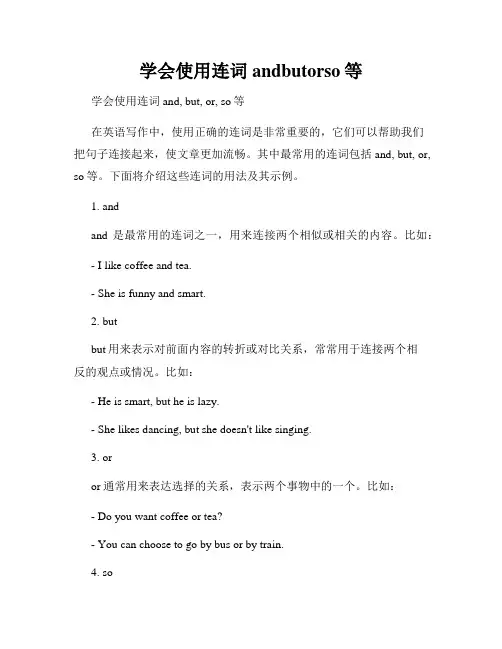
学会使用连词andbutorso等学会使用连词and, but, or, so等在英语写作中,使用正确的连词是非常重要的,它们可以帮助我们把句子连接起来,使文章更加流畅。
其中最常用的连词包括and, but, or, so等。
下面将介绍这些连词的用法及其示例。
1. andand是最常用的连词之一,用来连接两个相似或相关的内容。
比如:- I like coffee and tea.- She is funny and smart.2. butbut用来表示对前面内容的转折或对比关系,常常用于连接两个相反的观点或情况。
比如:- He is smart, but he is lazy.- She likes dancing, but she doesn't like singing.3. oror通常用来表达选择的关系,表示两个事物中的一个。
比如:- Do you want coffee or tea?- You can choose to go by bus or by train.4. soso通常用来表示结果、原因或推断关系。
比如:- She was tired, so she went to bed early.- He didn't study for the test, so he failed.除了上述连词,还有很多其他的连词可以用来连接句子,不同的连词有不同的用法和语境。
因此,在写作中要注意选择适当的连词,使文章表达更加清晰和连贯。
希望通过学习和掌握这些连词的用法,能够帮助大家提高英语写作的水平。
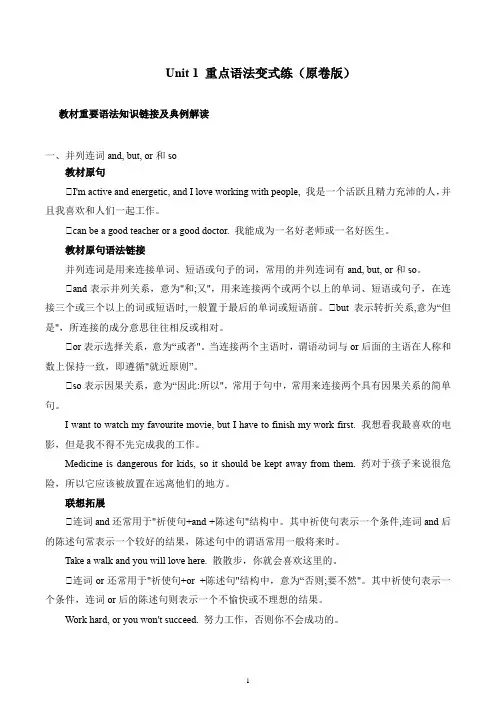
Unit 1 重点语法变式练(原卷版)教材重要语法知识链接及典例解读一、并列连词and, but, or和so教材原句①I'm active and energetic, and I love working with people, 我是一个活跃且精力充沛的人,并且我喜欢和人们一起工作。
①can be a good teacher or a good doctor. 我能成为一名好老师或一名好医生。
教材原句语法链接并列连词是用来连接单词、短语或句子的词,常用的并列连词有and, but, or和so。
①and表示并列关系,意为"和;又",用来连接两个或两个以上的单词、短语或句子,在连接三个或三个以上的词或短语时,一般置于最后的单词或短语前。
①but表示转折关系,意为“但是",所连接的成分意思往往相反或相对。
①or表示选择关系,意为“或者"。
当连接两个主语时,谓语动词与or后面的主语在人称和数上保持一致,即遵循"就近原则”。
①so表示因果关系,意为“因此:所以",常用于句中,常用来连接两个具有因果关系的简单句。
I want to watch my favourite movie, but I have to finish my work first. 我想看我最喜欢的电影,但是我不得不先完成我的工作。
Medicine is dangerous for kids, so it should be kept away from them. 药对于孩子来说很危险,所以它应该被放置在远离他们的地方。
联想拓展①连词and还常用于"祈使句+and +陈述句"结构中。
其中祈使句表示一个条件,连词and后的陈述句常表示一个较好的结果,陈述句中的谓语常用一般将来时。
Take a walk and you will love here. 散散步,你就会喜欢这里的。
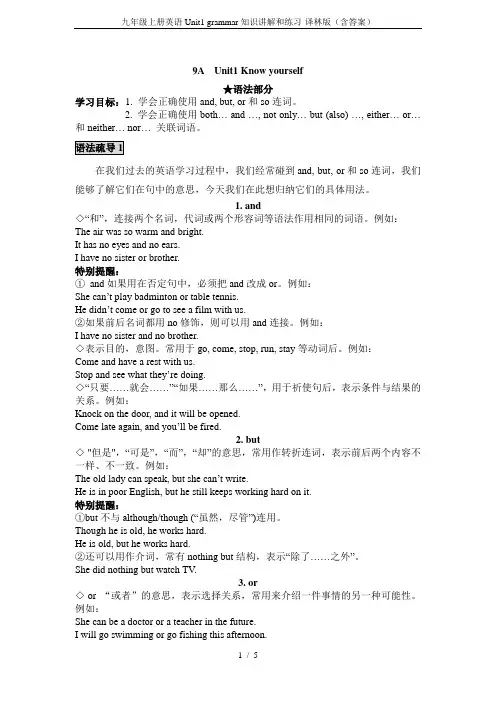
9A Unit1 Know yourself★语法部分学习目标:1. 学会正确使用and, but, or和so连词。
2. 学会正确使用both… and …, not only… but (also) …, either… or…和neither… nor… 关联词语。
在我们过去的英语学习过程中,我们经常碰到and, but, or和so连词,我们能够了解它们在句中的意思,今天我们在此想归纳它们的具体用法。
1. and◇“和”,连接两个名词,代词或两个形容词等语法作用相同的词语。
例如:The air was so warm and bright.It has no eyes and no ears.I have no sister or brother.特别提醒:①and如果用在否定句中,必须把and改成or。
例如:She can’t play badminton or table tennis.He didn’t come or go to see a film with us.②如果前后名词都用no修饰,则可以用and连接。
例如:I have no sister and no brother.◇表示目的,意图。
常用于go, come, stop, run, stay等动词后。
例如:Come and have a rest with us.Stop and see what they’re doing.◇“只要……就会……”“如果……那么……”,用于祈使句后,表示条件与结果的关系。
例如:Knock on the door, and it will be opened.Come l ate again, and you’ll be fired.2. but◇ "但是",“可是”,“而”,“却”的意思,常用作转折连词,表示前后两个内容不一样、不一致。
例如:The old lady can speak, but she can’t write.He is in poor English, but he still keeps working hard on it.特别提醒:①but不与although/though (“虽然,尽管”)连用。
or和but的用法一、介绍英语中的"or"和"but"是两个十分常用的连词,它们在句子中具有不同的用法和功能。
本文将详细介绍"or"和"but"的用法,以及它们在句子中所扮演的角色。
二、表示选择:or1. 表示两种或多种选择关系当我们需要从几种可能性中进行选择时,可以使用"or"来连接这些选项。
例如:"Would you like tea or coffee?"这句话意思是要求对方从茶和咖啡中选择一种。
2. 表示相互排斥关系有时候,我们需要表达两者之间的排斥关系,常用"either… or…" 或"neither… nor…" 的结构。
例如:"You can either go to the party or stay at home."这里使用了 "either... or..." 结构表示两者之间的互斥,即你可以选一个选项,而不能同时做两个。
3. 提出问题并给出备选项在提问时,为了给对方明确知道可以选择哪些答案,我们通常会使用 "or" 来列举备选项。
例如:"Is your favorite color blue or green?"通过使用 "or" 这个连词,问题更加明确且易于理解。
三、表示转折:but1. 表示对比、转折关系当我们想要将两个相比较的事物或观点进行对比或转折时,可以使用"but"来表达这种关系。
例如:"I want to go to the party, but I have to stay late at work."这句话中,“I want to go to the party”和“but I have to stay late at work”是对比的两个观点,后者对前者进行了否定或者表示了一种转折。
语法填空知识点:关于and、or和but 常规考点判断、解题思路和核心词汇用法Atule’er, a 200-year-old village in Sichuan province, made headlines around the world when photographs emerged in 2016 of schoolchildren (56) __________ (go) down the cliff (悬崖) on unstable hand-made ladders (梯子) (57) __________ “sky ladders”, as locals called them.The two-hour climb (58) __________ (be) the villagers’ only way to access the outside world. In recent years, local authorities have replaced their hand-made ladders with a steel one, (59) __________ (extreme) reducing their travel time.This week, however, 84 households of Atule’er left the ladders behind (60) __________ good, resettling in apartment blocks closer to (61) __________ town centre of Zhaojue county, 46 miles away. They live in new apartments ranging from 25 square meters to 100 square meters, (62) __________ have modern kitchens, toilets, running water, electricity and gas.Not all villagers have been relocated, however—about 30 households are planning to stay. Atule’er has become a tourist attraction. (63) __________ (far) development will service that industry, with officials plotting (64) __________ (build) a cable car to carry tourists up and down the cliff.In 2019, the Chinese government had made a (65) __________ (commit) to lift all of its 1.4 billion people out of poverty by 2020. The clifftop villagers’ resettlement is part of that broader drive, and they are not alone.题目中的提示词如下:go 动词去、进行be 动词是extreme 形容词极端的、非常的far 形容词远的;副词远、非常build 动词建造、积累commit 动词承诺、采取某种行动1. Atule’er, a 200-year-old village in Sichuan province, made headlines around the world when photographs emerged in 2016 of schoolchildren (56) __________ (go) down the cliff (悬崖) on unstable hand-made ladders (梯子) (57) __________ “sky ladders”, as locals called them.解题思路:句子里的谓语是made和emerged,两个谓语之间出现了从句关系词when,所以56题的go一定是非谓语。
9上Unit1 Grammar【学习目标】学习使用并列连词and、but、or、so和连接词both…and…,not only…but (also)…,either…or…, neither…nor…Step 1.PresentationPart A.1.and “和、又”,连接表示并列的单词、短语或句子。
eg.(1) The girl is friendly and helpful. (4)He is getting stronger and stronger.(2) I went into the car and drove it away. (5)Work hard, and you’ll get good results.(3)There is no air and no water on the moon.=There’s no air or water on the moon.2.but “但是”,连接表示意思相反或相对的词。
用了though/although不用but,用了but不用though/althougheg. (1)The house is very old but clean.(2)He is young but he knows a lot.= Though he is young, he knows a lot.(3)He worked hard, but he still failed the exam.= Although he worked hard, he still failed the exam.3.or 表示①选择②否则、不然③否定句中连接两个或更多的意思。
eg.(1) Do you go to school on foot or by bike?(2) Work hard, or you will fall behind.(3) There is no air or water on the moon.4.so “因此、所以”连接两个有因果关系的简单句。
牛津译林版九年级英语上册Unit1-8全册知识点归纳汇总牛津译林版九年级英语上册Unit 1复习知识点归纳汇总一、重点词汇单词creative adj.有创造力的;创造性的curious adj.好奇的energetic adj.精力充沛的modest adj.谦虚的organized( also organised) adj.有条理的;有效率的order n.顺序argue vi.辩论,争论born adj.天生的impress vt.给……留下印象sculpture n.雕塑,雕像praise n.赞扬,表扬accountant n.会计born adj.天生的upset adj.情绪低落的,沮丧的general adj.总的;普遍的race n.竞赛;赛跑lead n.主角,扮演主角的演员challenge n.挑战chief adj.主要的,首要的high-speed adj.高速的connect vt.连接miss n.错误,过失attention n.注意,专心standard n.标准pioneer n.先锋,开拓者surgeon n.外科大夫carelessness n.粗心extra adj.额外的;附加的devote vt,把……贡献,把……专用于respect vt.尊敬,敬重personality n.个性suitable adj.合适的;适宜的impatient adj.不耐烦的,急躁的lunar adj.阴历的calendar n.日历;挂历animal sign n. 生肖represent vt.象征appear vi.出现fixed adj.固定的cycle v.循环powerful adj.有力的;强大的lively adj.活泼的;生气勃勃的practical adj.实际的loyal adj.忠诚的mood n.心情,情绪divide vi.& vt.分开,分shape vt.使成形,塑造speech n.演说,讲话,发言monitor n.班长position n,职位词组1.share... with与某人分享2.eat up吃光3.keep in good order按照顺序放好4.show off炫耀5.explain.…to向某人解释……6.come up with想出(主意);追上,赶上7.be curious about对……感到好奇8.argue with与某人争吵9.either... or不是……就是;或者……或者10. neither... nor既不……也不……11.a born artist 一个天生的艺术家12. win high praise from 赢得高度赞扬13. search for寻找14. give up放弃15. sales department销售部16. work with与谁工作17.take the lead处于领先地位18. fall behind落后19. connect to/with与……相连,连接20. as good as和……几乎一样,简直是21. pay attention to关注22. be willing to乐意23. in fact事实上24.devote... to将……奉献给……25. be known for因为……而出名26. take part in参加27. animal sign生肖28. depend on依赖于,取决于29. star sign星座.30.divide… into将……分成……31. agree with sb同意(某人)看法二、重要句型1. It makes them feel good to share things with others.与别人分享东西使他们感到开心。
Unit 1 known yourself重点内容讲解Comic strip&W elcome to the unit重点短语1.使某人感觉很好make sb. feel good2.与某人分享某物share sth with sb3.吃光eat up4.极有条理的be well organized5.使……井然有序keep … in order6.炫耀show off7.想出新主意come up with new ideas8.对……感到好奇be curious about9.既不……也不……neither … nor …10. 一天到晚all day long教材解析1. It says some people are generous.[指点迷津]It says …. 它上面写着…… 。
e.g.The sign says “No parking”.The report says a new star is found by scientists.The paper says people should do more exercise.2. It makes them feel good to share things with others.[指点迷津]It makes sb. feel good to do sth. 做某事使某人感觉不错。
make sb. do sth. 使某人做某事3. Y ou’ve eaten up my breakfast.eat up 吃光use up 用光;耗尽(代词放中间,名词放中间或后面)4.Neither my parents nor I think I can make a good accountant.[指点迷津]neither … nor … “既不……也不……”,具有否定含义。
e.g.水既不太热也不太冷。
The water is neither too hot nor too cold.当neither … nor … 连接两个主语时,遵循“就近原则”。
中考指导:初中英语语法之连词连词是连接字、短语、从句与句子的词,是虚词,因此它不能独立担任句子成分。
连词主要分为两大类:并列连词和从属连词。
并列连词用来连接并列关系的词、词组或分句。
下面就来跟小编一起学习学习吧。
连词包括:and,or,but,so,for,both…and,either…or,neither…nor,not only…but also。
从属连词用来引导从句,它包括: that, when, till, until, after,before, since,because,if,whether,though,although,so…that,so that,in order that,as soon as并列连词用来连接具有并列关系的词,短语或句子。
常见的并列连词有:(1)表并列关系的and, both…and, not only…but also, neither…nor等。
(2)表选择关系的or, either…or等。
(3)表转折关系的but, while等。
(4)表因果关系的for, so等。
1并列连词1 and:和,并且I like basketball, football and table-tennis.我喜欢篮球、足球和乒乓球。
1.基本用法and表示“和”、“而且”的意思,用来连接对等关系的字和字,片语与片语,句子与句子。
He got up and put on his hat.他站起来,戴上了帽子。
I went to the Summer Palace and he went to Bei Hai Park.我去颐和园,他去北海公园。
注意单词或词组如果是三个以上连接,一般在最后的单词或词组前加and。
另外“and”在译成中文时不一定要翻译出“和”来。
2.特别用法:and在祈使句中的作用句型:祈使句,and…=If you…,you'll…Use your head,and you'll find a way.动动脑筋,你就会想出办法来。
◇“和”,连接两个名词,代词或两个形容词等语法作用相同的词语。
但否定句中用or。
但如果前后名词都用no修饰,则可以用and。
The air was so warm and bright.
It has no feet or legs.
It has no eyes and no ears.
I have no sister or brother.
◇“然后”。
用于连接两句有时间上先后的句子。
She washed the dishes and dried them.
◇表示目的,意图。
用于go, come, stop, run, stay等动词后。
Come and have a drink.
Go and buy one.
◇“只要……就会……”“如果……那么……”,用于祈使句后,表示条件与结果的关系。
Knock on the door, and it will be opened.
Come late again, and you’ll be fired.
but
◇但是,可是,而,却。
He is in poor health, but he still kept working.
◇用在表示歉意的话后,引起一个分句,这个but通常不译成汉语。
Excuse me, but can you tell me how to get to the railway station?
◇不与although/though (“虽然,尽管”)连用。
Though he is old, he works hard.
He is old, but he works hard.
◇作介词,表示“除了……之外”。
She did nothing but watch TV.
or
◇“一般疑问句+ or+被选择的部分”构成选择疑问句。
Do you like apples or pears?
Would you like tea or coffee?
◇“祈使句+or +陈述句”,表示“……,否则,……”
Hurry up, or you will be late.
Work hard, or you cannot pass this exam.
◇“和”,否定句中代替and。
I don’t like bananas or pears.
◇or 连接并列主语时,谓语动词的人称要与最后的那个主语保持一致。
Either you or he is right. 要么你要么他是对的。
◇or so 大约,左右
I’ll be there in an hour or so.
同步练习:
1.Hurry up, _________ you’ll be late for school.
2.Who’s the youngest, Rose, Helen ________ Betty?
3.Work hard, ______ you will succeed.
4.Excuse me, _______ could you tell me the way to the post office?
5.I’ll see you either on Monday _______ on Tuesday.
6.Put your coat on ______ you’ll be cold.
7.I’m sorry, _______ could you repeat that, please?
8.There is no one here ______me.
9.She can do anything _______sing.
10.The sky is blue ________ everything is beautiful.
11.We were very tired _______ we were very happy.
12.He never smokes ________ drinks.
13.There is no air ______ water on the moon.
14.Your classroom is clean _______ tidy.
15.My house is small _______ lovely.
16.Lucy worked hard at English ______ she came first in the English exam.
17.It is hot today, ______ some boys are still playing basketball outside.
18.People can’t live without air _____ water.
19.The Summer Palace is large _______ beautiful.
20.He looks tall and strong ______ he is afraid to go out at night.
21.We had no water ______ food at that time.
22.Hurry up! ______ we will be late!
e on! _______ you will win the match.
24.Be careful! _______ you will hurt yourself!
25.He usually goes to school by bus ______ by bike.
江苏13城市中考试题汇编:
( ) 1. We didn't enjoy the picnic _______ there was a sudden rain. (08连云港)
A.if
B. but
C. because
D. however
( ) 2. Work hard, _____ you'll pass the English exam this time. (08扬州)
A.or
B. but
C. because
D. and
( ) 3. He was sure his Dad would beat him, but his father didn't. ______, he picked up his crying son and kissed him. (08淮安)
A.Therefore
B. Indeed
C. Instead
D. But
Keys:
1. or
2. or
3. and
4. but
5. or
6. or
7. but
8. but
9. but 10. and
11. but 12. or 13. or 14. and 15. but 16. and 17. but 18. or 19. and 20. but 21. or 22. Or 23. And 24. Or 25. or
1. C
2. D
3. C。